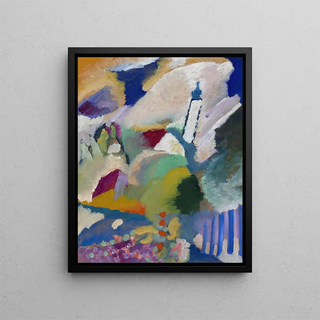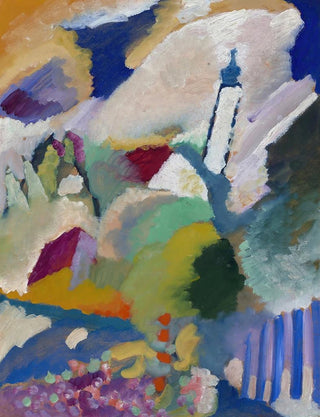Art print | Murnau with the church I - Wassily Kandinsky


View from behind

Frame (optional)
In the vibrant landscape of modern art, "Murnau with the Church I" by Wassily Kandinsky stands out for its ability to transcend the simple pictorial frame and immerse the viewer in a universe where color and form meet in a harmonious dance. This artwork, created in 1908, evokes the enchanting landscapes of Murnau, a Bavarian village that profoundly influenced the artist's imagination. Through this canvas, Kandinsky does not merely depict a place; he invites a sensory experience, an inner journey where emotion takes precedence over realistic representation. The art print Murnau with the Church I - Wassily Kandinsky offers access to this poetic and spiritual dimension, while providing an entry point into the fascinating world of abstract art.
Style and uniqueness of the work
The piece is characterized by a palette of vibrant colors, where bright hues and delicate nuances intertwine to create an atmosphere that is both serene and dynamic. Kandinsky, a pioneer of abstraction, uses geometric shapes and flowing lines that seem to vibrate across the canvas. The church, the central figure of the composition, stands majestically, while the surrounding landscapes transform into a symphony of colors and shapes. This bold approach to landscape representation reflects the artist's desire to capture the very essence of nature, beyond its mere appearance. Each brushstroke becomes a note in a visual melody, where the harmony of colors and the dynamism of forms unite to create a work of great emotional depth.
The artist and his influence
Wassily Kandinsky, born in Russia in 1866, is often regarded as one of the pioneers of abstract art. His artistic journey, marked by an unceasing quest for spirituality and personal expression, leads him to explore uncharted territories in the art world. Influenced by music, he develops a synesthetic approach where colors and shapes evoke sensations similar to those experienced when listening to a musical composition. His stay in Murnau

Matte finish

View from behind

Frame (optional)
In the vibrant landscape of modern art, "Murnau with the Church I" by Wassily Kandinsky stands out for its ability to transcend the simple pictorial frame and immerse the viewer in a universe where color and form meet in a harmonious dance. This artwork, created in 1908, evokes the enchanting landscapes of Murnau, a Bavarian village that profoundly influenced the artist's imagination. Through this canvas, Kandinsky does not merely depict a place; he invites a sensory experience, an inner journey where emotion takes precedence over realistic representation. The art print Murnau with the Church I - Wassily Kandinsky offers access to this poetic and spiritual dimension, while providing an entry point into the fascinating world of abstract art.
Style and uniqueness of the work
The piece is characterized by a palette of vibrant colors, where bright hues and delicate nuances intertwine to create an atmosphere that is both serene and dynamic. Kandinsky, a pioneer of abstraction, uses geometric shapes and flowing lines that seem to vibrate across the canvas. The church, the central figure of the composition, stands majestically, while the surrounding landscapes transform into a symphony of colors and shapes. This bold approach to landscape representation reflects the artist's desire to capture the very essence of nature, beyond its mere appearance. Each brushstroke becomes a note in a visual melody, where the harmony of colors and the dynamism of forms unite to create a work of great emotional depth.
The artist and his influence
Wassily Kandinsky, born in Russia in 1866, is often regarded as one of the pioneers of abstract art. His artistic journey, marked by an unceasing quest for spirituality and personal expression, leads him to explore uncharted territories in the art world. Influenced by music, he develops a synesthetic approach where colors and shapes evoke sensations similar to those experienced when listening to a musical composition. His stay in Murnau






